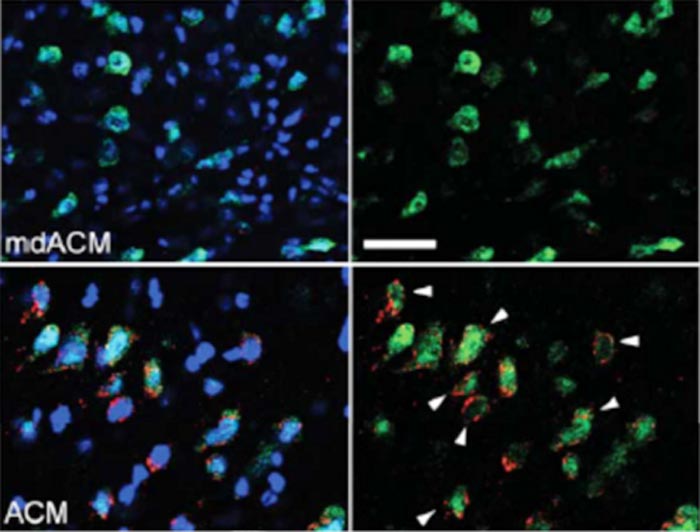Brain support cells transfer their mitochondria to fight free radicals

Level of Mn-SOD in neurons 21 days after hemmorage in mice that received mitochondria with and without Mn-SOD at one hour, seven days, and 14 days post-hemmorage. White arrows indicate the cells showing high Mn-SOD (red) in the neurons as a result of the treatment.
Credit: Tashiro et al., JNeurosci 2022
Transferring mitochondria bolsters neurons’ healing and improves recovery from a brain hemorrhage.
After a brain hemorrhage, neural support cells called astrocytes enhance healing by transferring their mitochondria to damaged neurons. The healthy mitochondria stimulate the production of a free radical-fighting enzyme, according to new research published in JNeurosci.
An artery in the brain bursts. Blood rushes into the tissue, inducing free radicals that cause even more damage. The hemorrhage damages mitochondria, the site of energy production in cells. Astrocytes transfer their mitochondria to damaged neurons after a hemorrhage. These healthy mitochondria contain a “healing” peptide called humanin and an enzyme called manganese superoxide dismutase (Mn-SOD) that help neutralize free radicals.
Tashiro et al. injected mice with healthy mitochondria after a hemorrhage. The hemorrhage reduced levels of Mn-SOD in the mice brain and increased the number of free radicals. Using molecular tags, the researchers found that the rodents’ neurons took up the mitochondria from the bloodstream. The mice who received the treatment showed improved neurological recovery, but the benefits decreased if the mice received mitochondria without the Mn-SOD enzyme. These results reveal mitochondria can transfer between brain cells to improve health and aide recovery.
Paper title: Transplantation of astrocytic mitochondria modulates neuronal antioxidant defense and neuroplasticity and promotes functional recovery after intracerebral hemorrhage
Please contact media@sfn.org for the full-text PDF and to join SfN’s journals media list.
About JNeurosci
JNeurosci, the Society for Neuroscience’s first journal, was launched in 1981 as a means to communicate the findings of the highest quality neuroscience research to the growing field. Today, the journal remains committed to publishing cutting-edge neuroscience that will have an immediate and lasting scientific impact, while responding to authors’ changing publishing needs, representing breadth of the field and diversity in authorship.
About The Society for Neuroscience
The Society for Neuroscience is the world’s largest organization of scientists and physicians devoted to understanding the brain and nervous system. The nonprofit organization, founded in 1969, now has nearly 37,000 members in more than 90 countries and over 130 chapters worldwide.
Journal: JNeurosci
DOI: 10.1523/JNEUROSCI.2222-21.2022
Method of Research: Experimental study
Subject of Research: Animals
Article Title: Transplantation of astrocytic mitochondria modulates neuronal antioxidant defense and neuroplasticity and promotes functional recovery after intracerebral hemorrhage
Article Publication Date: 15-Aug-2022
Media Contact
Calli McMurray
Society for Neuroscience
media@sfn.org
Office: (202) 962-4000
All latest news from the category: Life Sciences and Chemistry
Articles and reports from the Life Sciences and chemistry area deal with applied and basic research into modern biology, chemistry and human medicine.
Valuable information can be found on a range of life sciences fields including bacteriology, biochemistry, bionics, bioinformatics, biophysics, biotechnology, genetics, geobotany, human biology, marine biology, microbiology, molecular biology, cellular biology, zoology, bioinorganic chemistry, microchemistry and environmental chemistry.
Newest articles

First-of-its-kind study uses remote sensing to monitor plastic debris in rivers and lakes
Remote sensing creates a cost-effective solution to monitoring plastic pollution. A first-of-its-kind study from researchers at the University of Minnesota Twin Cities shows how remote sensing can help monitor and…

Laser-based artificial neuron mimics nerve cell functions at lightning speed
With a processing speed a billion times faster than nature, chip-based laser neuron could help advance AI tasks such as pattern recognition and sequence prediction. Researchers have developed a laser-based…

Optimising the processing of plastic waste
Just one look in the yellow bin reveals a colourful jumble of different types of plastic. However, the purer and more uniform plastic waste is, the easier it is to…



